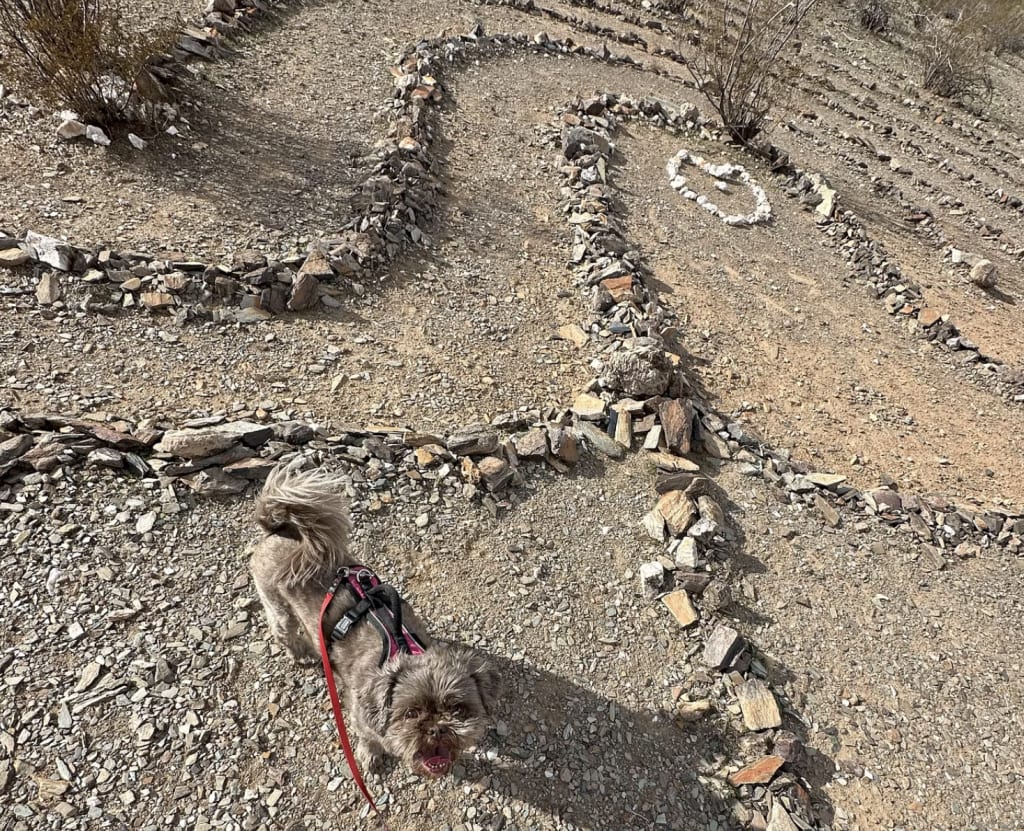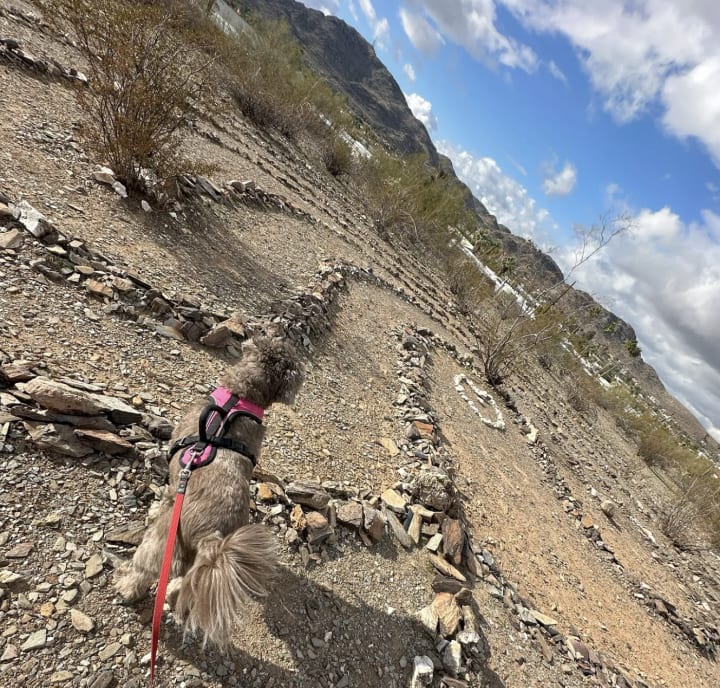8 Fear Conditioning Tactics That Taught Me Not to Trust Love
“Follow Your Heart” is Dangerous Advice for Survivors

The idea of falling in love again is bonkers to me, something I feel is a well-informed opinion.
It’s not that I don’t believe love is real. I’ve felt it. I feel it. Deep down, I’m nothing if not a sappy, helpless pile of romantic mush. An easy target.
Whatever that troublesome diva of a phenomenon is; chemistry, biology, sorcery, misery, I have no doubt it can be one of the most real things in this world. That’s also what makes it so unbelievably dangerous.
So why in the 9 Circles of Hell am I letting myself fall in love again?
Brick After Brick
In my imagination, there’s a single bricklayer, exhausted and panic-stricken, rushing to build walls around my vulnerable heart.
Her efforts are honorable but ultimately fruitless. Even if bricks could’ve saved me from the monsters who forced their way in, they can’t stop my foolish heart from falling for those who smooth-talked their way through the front door.
There’s nothing I long for more than to show someone those bruised, defenseless parts of me. To be accepted for all of the things I’ve learned makes me unworthy. To turn those brick walls into a home.
What makes me cringe away from the idea at this point is that, in my experience, believing in another person’s love for me has come with some pretty near-death consequences.
Ok, Drama 🙄
I know, I know, who hasn’t sworn off love after an awful heartbreak?
As anyone who’s loved and lost knows, the more intense the butterflies, the more convincing the courtship, and the worse the fallout when that love disappears or disappoints. Being wary about that happening again in the future isn’t exactly a hot take.
Unfortunately, as abuse survivors like me have learned the hard way, the consequences of loving the wrong person can be terrifying, irreparable, and even deadly. Those who do manage to escape situations of abuse tend to have difficulty with intimacy and vulnerability in future relationships.
And who could blame us for having trust issues? For not wanting to put ourselves at risk for that again? Breakups are hard enough without having to literally flee across the country to escape your ex.
Heartbreak Warfare: Love Bombing and Weaponized Emotions
The cycle of abuse can look annoyingly obvious once you get a step away from it, but it can be difficult to see the patterns from up close. This can be especially true with an experienced abuser who’s had the opportunity to hone their manipulative chops in past relationships.
With each partner they take advantage of, they become more adept at keeping the next one reeling.
It horrifies me to think that at some point I thought I really loved my abuser. I mistook his aggression for passion, his love bombing as genuine care and a desire to change his violent ways. He’d even use his own history of child abuse to excuse his behavior, knowing he could yank on my heartstrings and convince me to stay.
He knew just how to use my emotions to hurt, confuse, and control me. And despite my own personal and professional experiences with abusive relationships, I didn’t see him coming.
Research suggests that two of three individuals who are sexually victimized will be revictimized. — Classen, Palesh, & Aggarwal, R. (2005)
One of the most prevalent predictors of intimate partner violence is an experience of past abuse.
That’s already been true for me on multiple occasions, and knowing these risks is enough to make me wonder if it’s worth the trouble of trying to get close to anyone.
Pavlovian Fear Conditioning: Abuse and Learned Avoidance of Closeness
As was true in my case, abusers tend to exhibit patterns of extreme jealousy when it comes to other people in their victims’ lives. Victims are punished, often with increasing severity, for connecting with anyone other than their abuser.
This aversive conditioning can result in an instinctual withdrawal from, and avoidance of, close relationships with others, romantic or otherwise.
In Pavlovian fear conditioning, pairing an initially neutral conditioned stimulus (CS) (e.g., tone, light, or context) to an aversive unconditioned stimulus (US) (e.g., a footshock or tailshock) leads to the formation of a fear memory such that later presentation of the CS in the absence of the US elicits a conditioned response – Pavlov, (1927)
As the abuser gains control over their victim, they begin to methodically find fault with anyone in their support system who could jeopardize that control. Their aim is to isolate their victim, chipping away at their social circle using a variety of punishments and manipulations until they’re left believing they have no one except their abuser.
These tactics can look like, but are in no way limited to:
- Interrogating and/or shaming victims regarding past romantic history
- Monitoring victims’ phones, computers, or other forms of communication
- Restricting contact with loved ones, especially those who may see the signs of abuse and express concern about the relationship
- Intimidating or causing fights with loved ones, then forcing the victim to choose sides
- Controlling, or exploding over, even the most casual interactions with the opposite sex
- Accusing victims of being sexually or romantically involved with any and everyone they deem a threat, forcing them to twist into knots trying to defend themselves
- Making scenes or picking fights in public to humiliate the victim into not wanting to socialize
- Alternatively, putting on a show of being the life of the party in public, while privately terrorizing their target, leaving them looking and feeling like the problem
- Failure to comply with the abuser’s demands could result in severe punishments, leaving frazzled victims with a near-Pavlovian aversion to connection with others.
Even three years after my escape, I find it almost physically painful to look some of my dearest loved ones in the eye, so severe was the penalty for contacting them during my period of abuse.
Anytime I try to connect deeply, especially with someone my abuser would’ve found an issue with, I feel the hair on the back of my neck stands at attention. My nervous system constantly thinks my abuser is waiting to jump out of the bushes and punish me for daring to care for anyone who isn’t him.
Love Clouds Judgment. So Does Trauma.
Surviving abuse, I’ve recently come to realize, has caused me to become more avoidant in my attachment style. As someone who’s used to being more anxiously attached, this slide toward hyper-independence and fear of commitment is highly uncomfortable and causes a lot of internal conflict.
I talk myself out of trusting others, as much as I desperately long to, because it feels safer. I handle everything myself, as much as I struggle to do so because I’ve learned it’s the only way anything gets done. I’m afraid to fully open up to or rely on anyone, bracing for the abuse or abandonment that’s surely looming.
But is that what I escaped my abuser to do? Grit my teeth to get through each day on my own?

Trust Your Gut, But Don’t: Attachment Wound or Hard-Earned Wisdom?
Recovery from abuse is generally going ok, I suppose. I’ve done the reading, the therapy, the workbooks, the meds. I’m getting decent at recognizing when I’m getting overwhelmed and taking action to self-soothe. All of these have been hefty and rewarding endeavors that are definitely worth celebrating.
Sometimes it feels like I should have all the answers when it comes to my traumatized brain at this point. The truth is, however, I’m still so early in my recovery.
As a matter of fact, just now when I said I’m decent at taking action to self-soothe? The calm demeanor that’s been so impressive to those I confide in? I’m not even sure if I am truly calm, or if I simply underreact because I’m too afraid to outwardly show any strong emotions at all.
Sometimes I think that if I let myself unleash, the rage I’ve been forced to swallow over the years could raze cities.
So, yeah. I can read every study and memorize statistics to explain the theory behind why faith in human connection sends a chill down my spine, but explaining isn’t healing. I still have a lot of that to do.
A Lack of Understanding
I’m so far from reaching any real understanding of how my experiences have affected me or learning how to cope with the aftermath. There’s no rushing that process.
I both need to learn to trust my instincts and to avoid trusting them too much because they’ve been shaped by trauma and may cause me to make misguided decisions.
So do I choose to put myself at risk, despite all evidence pointing to the clear dangers of love? Or do I run away from the idea forever, never able to accept that someone could love me without eventual betrayal?
Stay tuned to find out!
I’m Glad You’re Here
Have you experienced similar issues with trusting relationships post-abuse? Did I miss any examples of manipulation tactics that could help someone see more clearly in a bad situation?
I’d love to hear your thoughts and advice (it’s clearly needed). Let’s make this a space for sharing resources and supporting one another as we heal from trauma together!
Subscribe in one click to receive your FREE digital copy of my new guided journal, “Empower and Heal: 90 Days of Transformational Prompts for Trauma Recovery, Self-Discovery, and Growth”, delivered straight to your inbox!
Veronica Wren Trauma Recovery Book Club
The Woman They Could Not Silence: The Shocking Story of a Woman Who Dared to Fight Back — Kate Moore
This post may contain affiliate links. This just means if you click a link and decide to make a purchase, I’ll earn a few extra pennies to support my book-buying habit (and do an elaborate, celebratory dance around my apartment just for you). My promise to you is that I’ll only ever recommend resources I truly believe in and have found beneficial in my healing journey. Happy reading!
About the Creator
Veronica Wren
Trauma sucks. Recovery shouldn't. Subscribe here for your FREE exclusive guided journal
❤️🩹 bio.link/veronicawren ❤️🩹
Domestic Abuse & CPTSD Recovery Coach






Comments
There are no comments for this story
Be the first to respond and start the conversation.